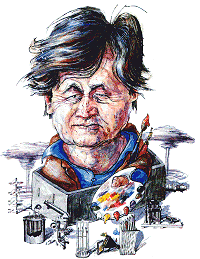
Media and Arts |
TV's 'man of letters' says science asks all the really important questions
- but we need a technology-appreciation course
I suppose that I'm fairly typical of my generation in that I had a poor science
education. I studied history, English and Latin at school, then did history
at university.Those are the things I understand; but I have nothing to reach
back to in science.
Nevertheless, in the last 10 years there has been a flood of books by scientists
aimed at people like me. Unfortunately, the huge amount of intellectual energy
invested in scientific literature has not been reflected in the media, where
science and engineering achievements make news only if they have relevance
to sex, money or sensationalism.
This is disappointing, because there's no build-up to new discoveries, or
any recognition that these studies continue every day,all over the world.
As a result, we're desperately ill informed.When a big event occurs, like
the Hubble space telescope, it comes as a shock.
There are, of course, various specialist radio programmes and magazines dealing
with science - and on TV Horizon
is an obvious example.But these all tend to be rather specific in their approach,
and science has fallen off the main agenda. In the 20th century, you'd expect
science to be a major preoccupation for all of us, but in reality it isn't.
This may be because science has got a bad name through association with eugenics
and the Bomb - people fear that it is somehow manipulative and dangerous.Also
it has become so specialised in certain areas that the layman feels a bit
intimidated and excluded by the language.
Yet science still exercises great attraction. On my radio programme Start
The Week, which reaches 1.4 million, we've put science firmly on the
agenda, featuring more than 100 science books in the last five years, and
many prominent scientists explaining their theories.
Listeners consistently respond better to these subjects than anything else.
It took us by surprise at first, but now we can count on a science feature
to provoke lively debate.
I also see many friends and colleagues being fascinated by the latest scientific
theories, although we're often flailing around to understand them. It might
be an idea to set up university courses in science for the general public,
so the importance of it all can be properly appreciated.
As a "man of letters", I am increasingly aware that science is, to a certain
extent, taking over the role once exclusively reserved for art: explaining
the great truths and meanings of our existence. Modern cosmology and astronomy
are making new discoveries about the universe every day and these discoveries
have implications that are quasi religious.Are we alone? What is the meaning
of life? What is our place in the universe?
Religion doesn't have answers to these questions any more, and younger
people no longer look to literature for them, as my generation did. Instead,
they have TV and video, and the films they watch make ever more exciting
use of technology. Their enthusiasm is undoubtedly fired by these influences,
and the sciences are now at the cutting edge of contemporary philosophy and
metaphysical speculation.
Art isn't redundant. We're still finding new cave paintings in South America,
and we're still writing fiction and telling each other stories. True, there
is no writer alive today who can compare to Shakespeare. But even among the
greatest artists and writers of today, no one is really discovering anything
new We are all climbing the same mountains which, in the case of art, is
the point of it all. The the field of science, on the other hand, some of
the greatest individuals and discoveries have appeared in my own lifetime
- the discovery of DNA, for instance, which may well prove to be the most
vital break-through in history. Science opens up new horizons all the time
and they are exciting significant and challenging.
Unlike science, art can only evolve, never advance. This is a distinction
I'm increasingly aware of, and it's the reason I feel science needs a wider,
more knowledgeable audience. Not because it is providing all the answers,
but because it is posing the very questions that are guaranteed to dominate
all our futures.
Melvyn Bragg's latest novel, Credo is published by Hodder and Stoughton,
f16.99.